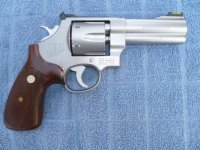johnny_yuma
Member
- Joined
- Aug 29, 2017
- Messages
- 34
- Reaction score
- 18
Glad to be aboard on the forum here. Just picked up my first Smith & Wesson Revolver -JM 625 45ACP. Im a 45ACP guy and its my favorite caliber to reload for so I fell in love with the 625.
I have a box of 500 "Better Bullets" Super Hard Cast Alloy Bullets in 200gr semi-wadcutter .452 that I picked up a few years ago for my 1911 that for no particular reason I hardly ever used. Nearly all my reloading is with jacketed bullets.
I realize that Hard Cast Alloy bullets are harder than lead bullets, but I'm still concerned about the rifling in my barrel getting gummed up and lead shavings gumming up my seating die.
Are Hard Cast Alloy bullets safe for my barrel, will they gum up my seating dies with lead deposits?
Point is, Im looking for a cheaper bullet solution than jacketed copper bullets. I have my eye on plated bullets too...
Thanks for your help in advance
I have a box of 500 "Better Bullets" Super Hard Cast Alloy Bullets in 200gr semi-wadcutter .452 that I picked up a few years ago for my 1911 that for no particular reason I hardly ever used. Nearly all my reloading is with jacketed bullets.
I realize that Hard Cast Alloy bullets are harder than lead bullets, but I'm still concerned about the rifling in my barrel getting gummed up and lead shavings gumming up my seating die.
Are Hard Cast Alloy bullets safe for my barrel, will they gum up my seating dies with lead deposits?
Point is, Im looking for a cheaper bullet solution than jacketed copper bullets. I have my eye on plated bullets too...
Thanks for your help in advance


